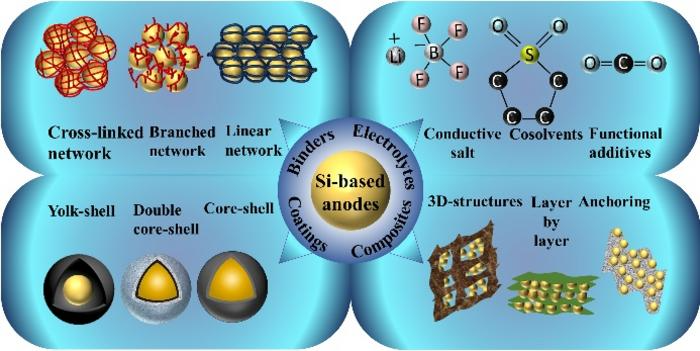Recent studies have shown that a number of chemical alterations (binders, composite materials, and electrolytes) improve the electrochemical performance and offer greater stability for Si-based anodes in lithium-ion batteries (LIBs).

The importance of silicon-based anodes in lithium-ion batteries, emphasizing their improved performance through modifications involving binders, coatings, composites, and electrolytes. Image Credit: Li Wang, Jianping Yang, Donghua University, Shanghai, China
Various chemical interactions have been attempted so far to improve Li+ kinetics, structural stability, and volume development control during the delithiation/lithiation process in Si-based anode materials.
Si and Si-based electrodes are still in their infancy and are far from seeing broad practical application, even with notable developments. Si-based anodes encounter several challenges, such as a significant increase in volume, a decrease in ICE, and a restricted area capacity.
To overcome these shortcomings, strategies including binder/electrolyte optimization, surface/interface engineering, and material engineering might be applied. The significant advancement in silicon-based anode materials for lithium-ion batteries was compiled by a group of researchers. On December 28th, 2023, their study was published in Industrial Chemistry & Materials.
The development of low-cost and facile manufacturing of silicon-based anode materials for lithium-ion batteries is crucial for the problem of significant volume expansion and its lower electrical conductivity, inconsistent kinetics reaction, and relatively low ICE.
Jianping Yang, Professor, Donghua University, China
Yang further said, “In this review, we systematically discussed the recent development of silicon-based anode materials according to vital concerns and challenges regarding the effectiveness of current strategies, the tremendous electrochemical resultant brought on using binders, composites, and liquid electrolytes with remarkable expected outcomes are presented as solutions. We also provided Si-based materials prospects on LIBs for the future commercialization potential of Si-based anodes alongside its major concerns.”
Yang added, “In the case of binders, the impact of binder on Si-based anode material is insignificant. For developing a new type of binder, it is expected to broaden half-cell to the full cell of LIBs to disclose the impact properly. As the full cell LIBs have less excess Li-ion, which could be a new prospect to enrich the performance LIBs.”
Yang continued, “Then the synthesis process of current binders is complicated which deprives its commercial and further improvement. Additionally, the performance of both ICE and reversible capacity should be high for the newly developed binder concerning traditional binders. Moreover, the new binder should be adaptable with not only a Si-based anode but also graphite-based anode materials as well”
Hybrid composites while doping Si with other materials could be a viable option that enhances the conductivity, ensures enough structural integrity, enhances tap density and areal capacity, and last least stabilizes the SEI formation. During hybrid composite preparation morphology, particle dimension, and coating could be considered to achieve the up-to-mark requirement.
Jianping Yang, Professor, Donghua University, China
“Si-based anode materials have achieved nonstop advancement in recent years,” explained Li Wang, an associate professor at Donghua University, China.
Electrolytes, in comparison to commonly used liquid electrolytes, showed great promise to enhance the outcomes in Si-based anode. Along with the newly designed liquid electrolytes, solid-state electrolytes should have proper physical and electrochemical properties as well as cost, energy, safety non-combustibility they might be attractive to study in the Si-based anode of LIBs. It is high time to make safety measures concern as per a priority during new findings.
Gazi Farhan Ishraque Toki, Study First Author, Donghua University, China
A novel Si-based anode materials architectural technique still has a lot of room to grow. For efficient Si-based anodes in LIBs, computational software like as ANSYS simulation, COMSOL Multiphysics, and other programs for theoretical analysis could be a useful supplement to tests.
They examine various optimizations using experimental data to determine the ideal configuration of electrolytes, binders, and composites based on variations in their configuration and experimental outcomes.
Yang stated, “In this review, our foremost goal is to deliver readers with apt and precise latest research advancement and materials design strategies in this field.”
The research team includes Gazi Farhan Ishraque Toki, Waheed Ur Rehman, Rana Zafar Abbas Manj, Li Wang and Jianping Yang from Donghua University in China; and M. Khalid Hossain from Bangladesh Atomic Energy Commission, Dhaka, Bangladesh.
This research was funded by the Fundamental Research Funds for the Central Universities and the National Natural Science Foundation of China.
Journal Reference
Toki, G. F. I., et.al., (2023). Recent progress and challenges in silicon-based anode materials for lithium-ion batteries. Industrial Chemistry & Materials. doi.org/10.1039/D3IM00115F.